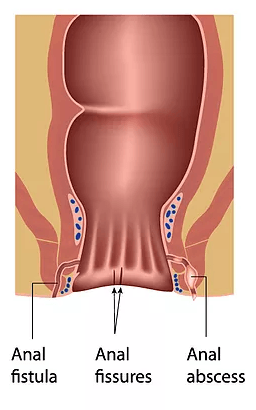Fissure
Know About
What is an anal fissure?
An anal fissure is a tear in the lining of the lower rectum (anal canal) that causes pain during bowel movements. Anal fissures don’t lead to more serious problems. Most anal fissures heal with home treatment after a few days or weeks. These are called short-term (acute) anal fissures. If you have an anal fissure that hasn’t healed after 8 to 12 weeks, it is considered a long-term (chronic) fissure. A chronic fissure may need medical treatment. Anal fissures are a common problem. They affect people of all ages, especially young and otherwise healthy people.
What causes an anal fissure?
Anal fissures are caused by injury or trauma to the anal canal. Injury can happen when:
- You pass a large stool.
- You are constipated and try to pass a hard stool.
- You have repeated diarrhea.
- You give birth. (Childbirth can cause trauma to the anal canal.)
Fissures can also be caused by a rectal exam, anal intercourse, or a foreign object. In some cases, a fissure may be caused by Crohn’s disease. Many experts believe that extra tension in the two muscular rings (sphincters) controlling the anus may be a cause of fissures. The outer anal sphincter is under your conscious control. But the inner sphincter is not. This muscle is under pressure, or tension, all of the time. If the pressure increases too much, it can cause spasm and reduce blood flow to the anus, leading to a fissure. This pressure can also keep a fissure from healing.

What are the symptoms?
You may have:
- A sharp, stinging, or burning pain during bowel movements. Pain from a fissure may be quite severe. It can be brief or last for several hours after a bowel movement.
- Itching.
- Bleeding. You may see a small spot of bright red blood on toilet tissue or a few drops in the toilet bowl. The blood from a fissure is separate from the stool. (Very dark, tarry stools or dark red blood mixed with stool may be a sign of a more serious problem.) Tell your doctor if you have any bleeding with a bowel movement.
Sometimes an anal fissure may be a painless wound that won’t heal. It may bleed from time to time but cause no other symptoms.
